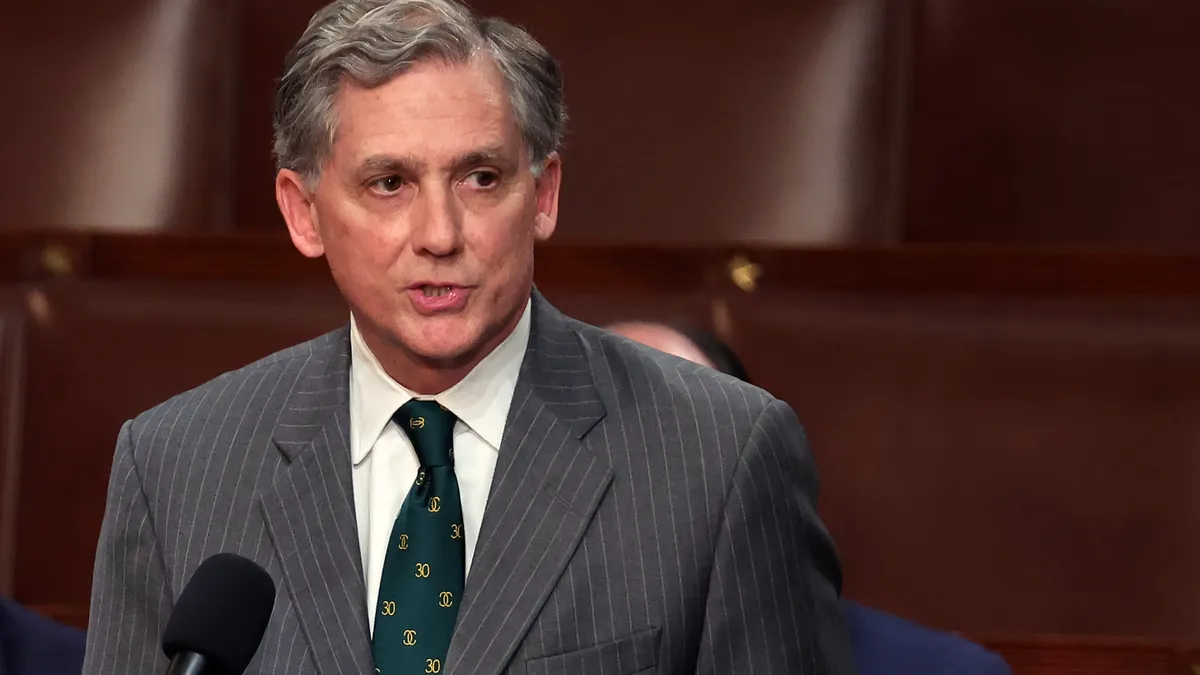Rep. French Hill, R-AR, has been chosen as the next chairman of the House Financial Services Committee, following the retirement of the committee’s current chair, Rep. Patrick McHenry, R-NC, at the end of his term.
“I am humbled that my colleagues have placed their trust in me to lead the House Financial Services Committee as their next Chairman,” Hill said in a statement Thursday.
Hill noted that he looks forward to working with House Republican leaders and the entire leadership team “in tandem with President Trump and Senate Banking Committee Chairman Tim Scott [R-SC] to bring common-sense economic policies that will produce a new era of American prosperity shared by all our citizens across our land.”
Hill, the panel’s vice chair, leads a subcommittee overseeing digital assets and financial technology. He had been vying for the top spot, alongside fellow contenders Andy Barr, R-KY; Frank Lucas, R-OK; and Bill Huizenga, R-MI, The Hill reported.
Hill was selected after a second ballot vote, the publication reported, citing unnamed sources.
The House Financial Services Committee monitors several important federal departments, such as the Department of the Treasury, the Federal Reserve, the Securities and Exchange Commission and government-sponsored entities such as Fannie Mae and Freddie Mac.
However, Trump’s team has been looking to reduce, merge or dismantle top bank regulators. A Wall Street Journal report Thursday detailed efforts focused on the Federal Deposit Insurance Corp.
Hill is also a member of the House Permanent Select Committee on Intelligence and the House Foreign Affairs Committee, and has been part of the Republican Steering Committee for the 118th Congress, which decided committee assignments.
Before entering Congress, Hill served as CEO of Delta Trust & Banking Corp. From 1989 to 1991, he worked in the Treasury Department as deputy assistant secretary of corporate finance.
“French’s experience in the private sector, the Treasury Department, and as Vice Chair have prepared him for this role,” McHenry said in a statement. “With French Hill at the helm, Republicans will build on our work from this Congress to finally enact a clear regulatory framework and robust consumer protections for the digital asset ecosystem.”
Hill’s FIT21 legislation, which received bipartisan approval in the House in May, aims to create a comprehensive regulatory framework for digital assets that protects consumers and investors while maintaining the country's competitive edge in blockchain innovation.
During an interview with CNBC on Friday, Hill said the committee would work to create a favorable market for cryptocurrencies, though he’s not sure whether the U.S. should build a bitcoin reserve.
Hill has been vocal about reshaping financial policies, focusing on reducing redundancies and tailoring bank regulations to suit small community banks.
“Let's make community banking and commercial banking competitive again by removing some of the calcification in the regulatory system that's made it so hard to be profitable, serve customers and be safe and sound,” Hill told CNBC.
The banking industry lacks sufficient competition due to the regulatory structure that “actually pushes consolidation in the banking industry to the largest bank because nobody can cope with the regulatory burden,” he said.
In his quest to win the chair role, Hill published a community banking plan, “Make Community Banking Great Again.”
The principles, released last month, advocated for reinstating regulatory tailoring for community banks, requiring regulators to customize their oversight based on each bank's specific characteristics. Additionally, he proposed increasing the consolidated asset threshold under the Small Bank Holding Company Policy Statement to help community banks more easily access debt financing and support their growth.
Hill’s other recommendations included tailoring bank mergers and acquisitions so regulators cannot indefinitely delay mergers, access to capital, revisiting bank resolution procedures and welcoming innovation related to banks’ third-party relationships.
Industry leaders praised Hill’s proposal on community banking, saying his recommendations would ease regulations on community banks and helped them thrive in a competitive marketplace.






















